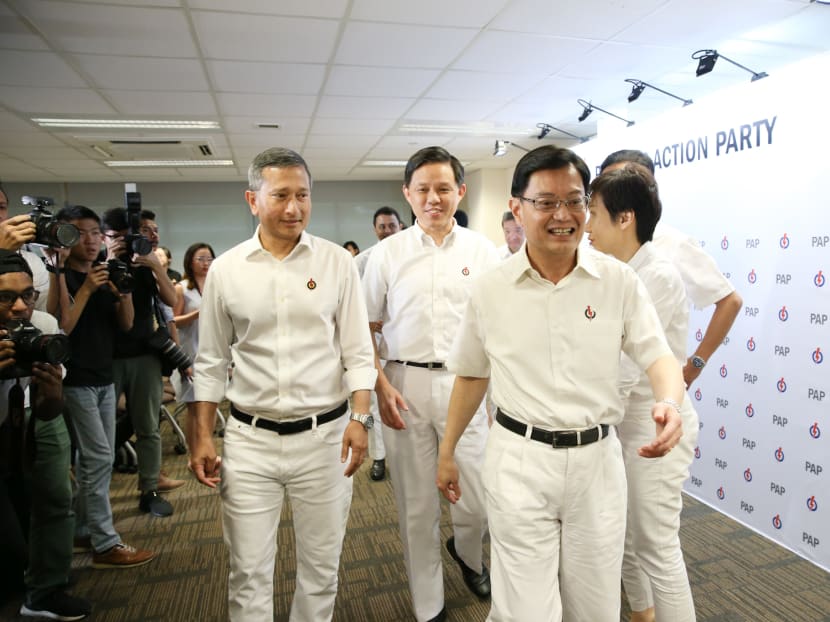My health is ‘better than before’, says Heng Swee Keat
SINGAPORE — Giving assurance that his health is “better than before”, Finance Minister Heng Swee Keat said on Friday (Nov 23) that he would not have accepted the position of first assistant secretary-general in his party if he did not “have the confidence that my health allows me to do it”.

Finance Minister Heng Swee Keat and Trade and Industry Minister Chan Chun Sing leaving a press conference, shortly after the People’s Action Party unveiled its slate of office-bearers on its new Central Executive Committee.
SINGAPORE — Giving assurance that his health is “better than before”, Finance Minister Heng Swee Keat said on Friday (Nov 23) that he would not have accepted the position of first assistant secretary-general in his party if he did not “have the confidence that my health allows me to do it”.
Mr Heng’s appointment was confirmed after the ruling People’s Action Party (PAP) announced on the same day the lineup of office bearers as part of its new Central Executive Committee (CEC), which is the party’s highest decision-making body.
Sign up for TODAY's WhatsApp service. Click here:
Asked about this at a press conference on Friday, Mr Heng said that he had made a “very good recovery”. Before taking up the appointment, he had consulted his doctors, “looked at the medical reports as well as knowing my own energy level”.
“The doctors have given me a clean bill of health, and in fact, in my latest medical check-up, my results are even better than before,” he said. “I have lost a bit of weight just because I am fitter now, spending more time on my exercise.”
He agreed to take on the first assistant secretary-general role only “after thinking about it very seriously, and in particular, making sure my health allows me to do it”, said Mr Heng.
In the late afternoon of May 12, 2016, Mr Lee revealed that Mr Heng had collapsed during a Cabinet meeting.
After he was rushed to Tan Tock Seng Hospital (TTSH), a CT scan revealed that he had suffered a sudden stroke due to an aneurysm, a localised weakening of a blood vessel. Mr Heng subsequently underwent brain surgery.
It was revealed later that three Cabinet members had rushed to his aid. Among them was Dr Janil Puthucheary — now the Senior Minister of State for Transport, and Communications and Information — who began resuscitation efforts while waiting for the ambulance.
Foreign Minister Vivian Balakrishnan and Defence Minister Ng Eng Hen also tended to Mr Heng after he collapsed. Mr Heng was discharged less than two months later, and made a miraculous recovery.
Touching on his health scare at the press conference, Mr Heng said he is “very blessed and very grateful for the support of our fellow Singaporeans”. He also thanked his Cabinet colleagues who gave him “very good support and immediate care”, as well as the team of doctors, nurses and therapists at TTSH and the National Neuroscience Institute.
“This very major life and death episode has strengthened my commitment to serve Singaporeans,” said Mr Heng.
“Because I personally, and my family, feel the care and support that so many Singaporeans gave to me… I have so many religious leaders and religious groups who have prayed for me and I am very, very grateful, and I feel that I should do my very best to serve Singaporeans, to make sure that what we have achieved in Singapore can continue.”
Since he is expected to become Singapore’s next leader, he was also asked whether the international travel trips might affect his health.
But Mr Heng, who will be heading to Argentina next Monday for the G20 summit, said that he has already “done so much international travel” this year. In fact, he has travelled even more than when he was the managing director of the Monetary Authority of Singapore, a post he relinquished in 2011 to join politics, he added.
.embed-container { position: relative; padding-bottom: 56.25%; height: 0; overflow: hidden; max-width: 100%; } .embed-container iframe, .embed-container object, .embed-container embed { position: absolute; top: 0; left: 0; width: 100%; height: 100%; }RECOVERY SHOWS RESILIENCE
Political analysts told TODAY that worries over Mr Heng’s health were legitimate, and would continue to surface. But it is not an issue for now, given the politician’s swift recovery and his active engagements in the public eye since.
There is a careful process to determine whether top leaders are fit to take on the demands of their jobs, which could include medical tests, they added.
Associate Professor Eugene Tan, a law lecturer with the Singapore Management University, said the concerns might be unnecessary, as the Government would also not wish for its best-laid plans to be scuttled on account of a leader not being able to “handle the demands of the job”.
“It is a concern that needs to be addressed, and we’ll see that question arising, but his swift recovery does suggest to us that despite the severity of the brain aneurysm, he has made a full recovery,” he said.
Agreeing, Dr Gillian Koh, deputy director for research at local think tank, Institute of Policy Studies, said Mr Heng’s rapid recovery showed the politician’s “resilience”.
Political scientist Woo Jun Jie, from the Nanyang Technological University’s School of Social Sciences, said Mr Heng has been quite active since returning to work just months after his stroke.
“The more that he engages the public and performs his role without any hiccups, it’s more likely that… questions over his health will become less and less important over time,” said Assistant Professor Woo.
.embed-container { position: relative; padding-bottom: 56.25%; height: 0; overflow: hidden; max-width: 100%; } .embed-container iframe, .embed-container object, .embed-container embed { position: absolute; top: 0; left: 0; width: 100%; height: 100%; }










